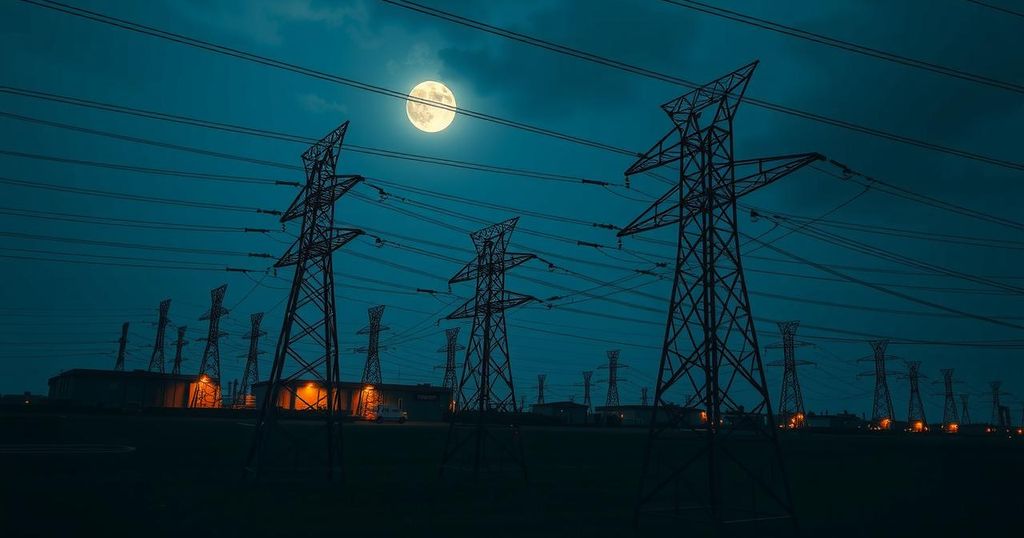Climate Change Pressures Brazil’s Electric Sector to Strengthen Resilience Against Extreme Weather
The recent storm in São Paulo resulted in a blackout affecting over 3 million consumers, igniting urgent discussions on regulatory changes necessary for enhancing the city’s electrical grid resilience amid increasing climate-related weather events. Stakeholders are advocating for significant investments and updated regulations to ensure that power distribution networks can withstand future climate extremes. Enel São Paulo announced a R$6.2 billion investment plan from 2024 to 2026, aiming to improve network robustness in response to growing climatic challenges.
The recent storm that ravaged São Paulo, resulting in the loss of electricity for approximately 3 million consumers, has intensified discussions regarding the urgent need for regulatory changes aimed at enhancing the robustness of Brazil’s power distribution networks. This is particularly crucial given the increasingly severe climate events witnessed over the past year. The current discourse surrounding the electric sector has been propelled by two significant storms that have left extensive portions of Brazil’s largest city without power, scrutinizing the accountability of Enel São Paulo—the utility provider serving the capital and surrounding municipalities. The latest storm, characterized by wind gusts reaching up to 107 kilometers per hour, caused extensive damage as it brought down trees and disrupted the power network, prompting critical reflections on the roles of both the utility company and the city government in addressing these recurrent incidents. The trend towards more severe climate events is alarming, as evidenced by earlier disasters this year, including devastating storms in Rio Grande do Sul and the coastal cities of Ubatuba and São Sebastião, as well as the metropolitan region of Recife. Concurrently, Brazil is grappling with its worst drought in history. Regina Célia dos Santos Alvalá, the director of CEMADEN, emphasizes that all sectors vulnerable to extreme weather patterns, including the electric sector, must adapt to the evolving climate. “Today’s climate is not the same as the climate of the past,” asserted Ms. Alvalá. The urgency of these discussions is underscored by the financial implications of investments made by distribution companies, which are governed by the Brazilian Electricity Regulatory Agency (ANEEL). Investments deemed “imprudent” do not influence tariff rates, leading utilities to actively seek regulatory frameworks that facilitate necessary enhancements to infrastructure. In response to rising concerns, ANEEL has prioritized network resilience, launching a public consultation to consider guidelines for renewing concessions for 20 distribution companies beginning in 2025. This initiative aims to hold companies accountable for ensuring the quality and reliability of electricity supply amid extreme weather conditions. Bruna de Barros Correia, an energy law expert, notes a paradigm shift in the sector’s focus from merely mitigating greenhouse gas emissions to also fortifying the electrical infrastructure against extreme climate phenomena. Each utility provider is expected to tailor its response to unique regional vulnerabilities. Moreover, ANEEL employs incentive regulation in its tariff calculations, rewarding companies for supplying high-quality service based on metrics of interruption frequency and duration. However, this metric does not account for outages arising from extraordinary circumstances, indicating a critical need for a legislative review. Guilherme Lencastre, CEO of Enel São Paulo, highlighted the necessity of updating concession agreements to encompass preventative measures for climate-related disruptions. He asserted, “It was the largest wind gust event ever reported in São Paulo’s history. We did not have forecasts for winds of the intensity that happened on Friday.” Following inquiries from the press, Enel São Paulo reiterated plans to invest R$6.2 billion from 2024 to 2026, substantially increasing its average annual investment in infrastructure. ABRADEE, the Brazilian Association of Electric Energy Distributors, reported substantial ongoing investments from distribution companies focused on enhancing grid resilience. According to Ricardo Brandão, executive director of regulation at ABRADEE, approximately 37% of R$130 billion earmarked for investment until 2027 is dedicated to structural improvements. The complexity of restoring power in cases like the recent storm arises from the necessity of physically reconstructing the damaged grid, which can be a protracted process. However, advancements such as “self-healing” technologies allow for automated reconnections in outage scenarios, thereby optimizing resource allocation for restoration efforts. Mr. Brandão confirmed that addressing the impact of extreme weather is increasingly prioritized within modernization strategies.
The electric sector in Brazil faces critical discussions regarding the resilience of its infrastructure in the wake of increasing climate crises. Recent storms in São Paulo exemplify the urgent nature of these conversations, highlighting the need for regulatory reforms to bolster power distribution networks, ensure reliable electricity supply, and adapt to the challenges posed by climate change. Various stakeholders, including utility companies like Enel São Paulo and regulatory bodies such as ANEEL, recognize the necessity of future-proofing infrastructure against severe weather incidents, which are occurring with greater frequency.
The recent blackout in São Paulo has sparked heightened debate on the need for improved resilience in the electric power sector in Brazil. As climate change continues to intensify weather-related disruptions, regulatory agencies like ANEEL and utility providers must prioritize strategic investments in infrastructure to ensure reliability and adaptation to extreme conditions. Failure to address these challenges may have profound implications for both consumers and the sustainability of energy systems in Brazil.
Original Source: valorinternational.globo.com




Post Comment